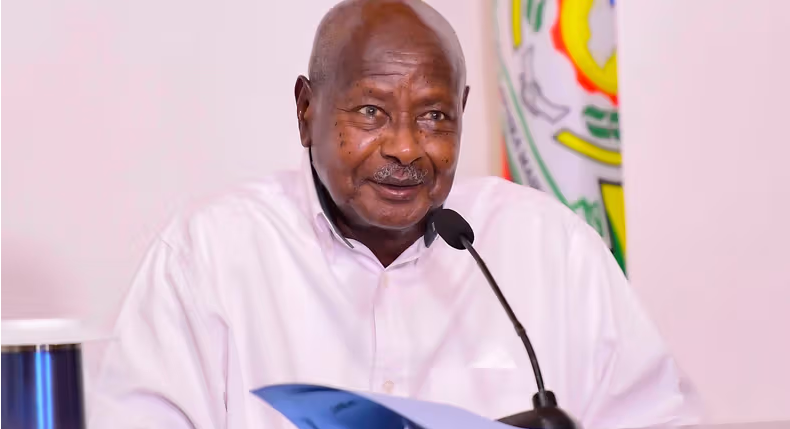


“These are the costs of electricity, water, transport, the cost of money borrowed from banks, etc.. As we lower these costs to rational and realistic levels, we will be able to correctly deal with the issue of the salaries of workers. Otherwise, we are pushing for all-around industrialization, using our raw materials from agriculture; forestry; fisheries; minerals; etc.,” said President Museveni while delivering his end-of-year address to the nation in his country home in Rwakitura, Kiruhura district.
The President explained that the National Resistance Movement (NRM)’s plan has always been to shift people from agriculture to industry and services. According to President Museveni, those sectors’ absorption capacity is much bigger than agriculture.
“Too many people in agriculture is part of the under-development. A tractor can plough 1,200 acres in a season. The 40 million acres of Uganda that are arable, therefore, need 30,000 tractors and their drivers,” he said. “Even when you include other activities such as harvesting, you will find that the present huge number of people in agriculture are redundant; therefore, they are part of disguised unemployment. In the coming year, we shall continue our efforts in rationalizing the economy and society of Uganda.”
The President also appealed to the citizens to create wealth and jobs through the four sectors of the economy which include commercial agriculture with “ekibaro”, industry, service and ICT.
“This ekibaro requirement forces us to distinguish between intensive agriculture (okukolera awafunda – working using small acreage) and extensive agriculture (using medium-sized or large-scale pieces of land). In the former, I have advised you ever since 1995, to only go for high value activities from which you can get good money even if you do them on a small scale,” Museveni asserted.
He, however, noted that a capable country like Uganda cannot have intensive agriculture, without extensive agriculture.
“Please Ugandans with agricultural land, this is the way to go. These policies have already caused a lot of changes in our economy. Coffee production now stands at 9 million bags from 2 million bags in 1986. Milk production is now 5.2 billion litres from 2m litres in 1986. The cattle are now 16 million compared to 3 million in 1986. Tea production is now 60 million kgs compared to 3 million kgs in 1986. I can go on and on. This expansion is by those families that listened to our message. What will happen if all the families with land for agriculture listen to our message?” he inquired.
On part of the industry, which is categorised into factories and artisanship, President Museveni revealed that Uganda now has 8,617 Factories that employ 829,668 people.
“Factories are flooding in. The only slowing factor has been the corruption of some parasites that have been asking for bribes to give the entrepreneurs land or licences. Otherwise, the potential is huge. Additionally, we need to harmonize with our people working in the factories,” he said.
“I have set up 18 Skilling Hubs in the whole country. These skilling hubs deal with carpentry, metalwork, shoe making, motor mechanics, etc. I have directed the State House Comptroller (SHC), to expand the spectrum of the skills to include textile technology, ceramics, ICT, etc. This is in addition to the Technical Colleges in the country. On the side of the capital after getting the skills, there is the Emyooga money. We are also ready for any other ideas as to how we can empower the skilled youth after their training.”
On the services sector, the President said that the government was working towards disciplining some aspects of the sector, including assisting, for instance, the musicians to record their songs and also protecting their innovation by Copyright Law.
“The ICT sector is new, but many of the ICT graduates are being absorbed into this sector. It is now employing 2.3 million people (both direct and indirect jobs). It will, however, grow more when our people implement BPO (Business Process Outsourcing) – which means that you, for instance, set up book-keeping operations in Kampala, but you provide those services to companies in the USA or Canada and send the work over our Internet and you are paid here.”
President Museveni further assured Ugandans of the government’s commitment to put an end to corruption.
“Those who have allowed themselves to soil their contribution, have only themselves to blame. As I said, recently, the corrupt are the minority and it is those who have access to power and public money and they use that access to be corrupt at the expense of the majority who are the victims. It is, however, easy to trace these parasites and smoke them out. Keep tuned on this channel,” he cautioned.
On the issue of regional integration, President Museveni said the process is very vital for a country like Uganda because it helps people to create prosperity through the wider market it provides for their goods and services.
“Some Ugandan businesspeople cite the non-tariff barriers practised by other countries. In the early years of our Government, Mzee Moi, at one time, closed the border, but I rejected the arguments for retaliation,” he said. “Today, Uganda’s exports to Kenya are either equal to our imports from there or, sometimes, they are higher. Rationality cannot be ignored indefinitely. We shall continue discussing with our EAC Partners and, I am sure, we shall end up with a real common market, free of non-tariff barriers because those barriers hurt the wanainchi of all our countries.”
In the same address, President Museveni informed Ugandans that the government is continuing to destroy the Allied Democratic Forces (ADF) terrorists from the Democratic Republic of Congo (DRC) using mainly air attacks because they are faster and can reach everywhere.
